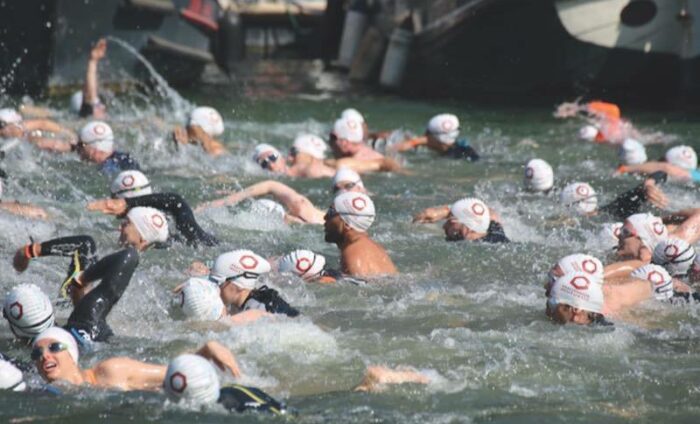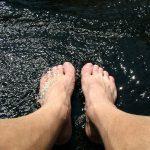
View from the water – wetsuit or skins?
Wetsuit or skins? Simon Griffiths believes we should swim and let swim
Earlier this year we had a vigorous exchange of letters in our pages about the use or non-use of wetsuits. Wetsuits are the most controversial topic in outdoor swimming that I know of, so I thought it was about time I set out our position as a magazine and share my own opinion.
We have a huge amount of respect for the history and traditions of outdoor swimming and for the people swimming today who adhere to those traditions and uphold them. But we believe the development and use of swimming wetsuits has encouraged many people into the water who wouldn’t be there otherwise. Personally, I prefer swimming without a wetsuit, as long as it’s not too cold and not for too long, but I also like swimming, and racing, in a wetsuit.
I don’t have data to back this up, but it’s my belief the outdoor swimming communities are among the most tolerant and accepting you’ll find anywhere, except when it comes to wetsuits.
The fundamental reason for the debate is that wetsuits make you faster and allow you to cope with cool water for longer. This strikes traditional swimmers as being unfair, but it’s only unfair if you’re making a comparison with swimmers who aren’t wearing wetsuits. The answer seems obvious: stop comparing.
However, this isn’t always straightforward. For example, I recently took part in an event in Paris, where wetsuits were optional and the water temperature was 24 degrees. Anyone who’s seen me swim knows that cold water tolerance isn’t my best feature, but even I can cope with 5k in 24 degrees. However, there was no separate wave or classification for non-wetsuit swimmers and the majority of other competitors opted to wear one.
For me, wearing a wetsuit over 5km saves me about 12 to 15 minutes. I know because I did one a week later without and was 13 minutes slower. In Paris, those 13 minutes would have put me about 100 places lower in the final finishing order. Does this matter? In the grand scheme of things, it makes no difference whether I finish 22nd or 122nd – but it still matters to me. Maybe I have an ego problem, but I wore a wetsuit because I wanted to compete on an equal level. Ideally, I’d like to see more event organisers putting wetsuit and non-wetsuit swimmers in different waves, or at least noting the distinction in the results.
Equally, if someone completes a challenging swim without a wetsuit, it matters to them that it is recognised to be a more difficult accomplishment than if they had swum it with a wetsuit. We should respect this rather than dismissing it as old-fashioned, petty or purist. A long distance swim in a wetsuit is still a significant achievement but it is a different one. We need to be honest about this.
When it comes to recreational swimming, I don’t see the need for any fuss or discussion at all. If you feel safer and more comfortable in a wetsuit, wear one. If you prefer the feel of cool water against your skin, go ahead and indulge yourself, but don’t mock or judge those who choose not to. Also, there’s no need to define yourself as either wetsuit or non-wetsuit swimmer. Choose differently each time you swim, depending on temperature, how long you want to stay in and what you want to do. You really can have the best of both worlds. Let’s extend the tolerance of the open water community to cover swimmers’ choices when it comes to neoprene. Swim and let swim.
Simon Griffiths is the founder and publisher of Outdoor Swimmer
Email Simon at: simon@outdoorswimmer.com







